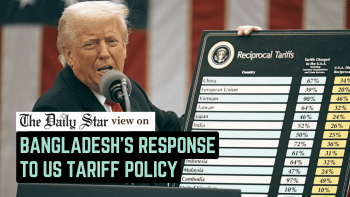Tariff reversal should prompt a rethink of our trade strategies

It is heartening to learn that US President Donald Trump has paused the imposition of sweeping "reciprocal" tariffs on imports from nearly all its trading partners, including Bangladesh—a dramatic reversal that stunned the world almost as much as the initial announcement of the new tariff regime. Less surprising, perhaps, is the exclusion of China from this reprieve, as it continues to face even harsher levies. For other countries, only a flat 10 percent tariff which took effect on Saturday will now remain. However one interprets the 90-day pause—a tactical move to reduce trade deficits, a hawkish strategy to isolate China, or a reluctant step to calm volatile markets—there is no denying that it is a welcome relief for countries like Bangladesh.
The US is Bangladesh's second-largest export destination, accounting for nearly $10 billion in export earnings in 2023, more than 80 percent of which came from the RMG sector. For an economy so dependent on a single sector and a few core markets, any disruption in trade poses grave risks. For example, if the US reciprocal tariffs stand as originally outlined after the end of 90 days, RMG exporters may face a major challenge with up to 53.5 percent levies, industry insiders say. Thus, the tariff reversal should be seen not only as a breathing space but also an opportunity to negotiate better terms while taking steps to remove all non-tariff barriers in our bilateral trade.
For an economy so dependent on a single sector and a few core markets, any disruption in trade poses grave risks. For example, if the US reciprocal tariffs stand as originally outlined after the end of 90 days, RMG exporters may face a major challenge with up to 53.5 percent levies, industry insiders say. Thus, the tariff reversal should be seen not only as a breathing space but also an opportunity to negotiate better terms while taking steps to remove all non-tariff barriers in our bilateral trade.
At the same time, we must think about building a more resilient future for our export-based economy. It is crucial to diversify our export base beyond RMG, which, despite being a success story, makes us dangerously vulnerable to external shocks. Simultaneously, our focus must extend much beyond the US. True, Bangladesh may benefit from the stiff US levies on Chinese products, the European Union, another key destination for our products, may soon be inundated with Chinese garments diverted from the US, undermining our competitiveness in that market. Keeping in mind the reality of Bangladesh losing some trade privileges after its LDC graduation, it is also crucial that we critically rethink our export-import strategy and prepare for a more competitive post-LDC landscape.
To spur growth through greater market integration as well as infusion of international investments, it is equally important that the government seriously acts on prevailing concerns about obstacles to doing business in Bangladesh. Many of these concerns were raised at the just-held Bangladesh Investment Summit. A new report by the World Bank, unveiled at the summit, highlighted five key obstacles including corruption, erratic power supply, high prevalence of informal economy, high borrowing costs, and complex tax structure. These need to be addressed. Importantly, the WB also identified four key sectors, including RMG, as ripe for reform. We must address all these interconnected issues if we want to progress in today's rapidly shifting global trade landscape.


 For all latest news, follow The Daily Star's Google News channel.
For all latest news, follow The Daily Star's Google News channel. 







Comments